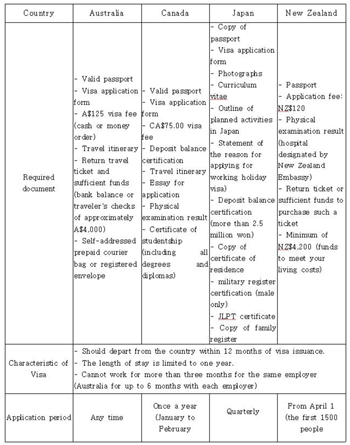 With winter vacation coming, many students are getting interested in working holidays because of the possibility of both earning money and studying English. Hence, the Gazette chose the topic of working holidays in issue 132. The Gazette hopes all Keimyung students can get much information about working holidays and enjoy their winter vacation.
With winter vacation coming, many students are getting interested in working holidays because of the possibility of both earning money and studying English. Hence, the Gazette chose the topic of working holidays in issue 132. The Gazette hopes all Keimyung students can get much information about working holidays and enjoy their winter vacation.● Working holiday
A working holiday makes it possible to both work and travel in a country. People can make money through part-time jobs and use that money to travel and to study and improve their English skills. A working holiday is popular with young people, especially university students.
● Working holiday visa
When we go abroad, we need a visa. The working holiday visa is a little different from other visas. It functions as a tourist and work visa unlike a general visa, which does not allow foreigners to work. This visa is available only once to young people aged from 18 to 30, and they can stay in the country exactly a year.
● Participating countries
Korea has concluded agreements with four countries: Australia, Canada, Japan, and New Zealand. There are necessary qualifications for working holiday visas in each country.
● Common qualification
Nationality: Korean passport holders.
Age: 18 to 30
Marriage: Married people can join this, but they should not have dependent family.
● Preparation for working holiday
The purpose of a working holiday is to get diverse experiences. You can meet many people and can have special experiences, but you need some preparation before you leave.
- Medical treatment
In Australia and Canada, medical expenses are very expensive. For that reason, having medical treatment for slight illnesses, like a decayed tooth, is important before you leave Korea.
- Don't bring food.
People often bring Korean food, for example, kimchi or instant noodles. However, in Australia and Canada, it is easy to find Korean food because of the high demand from many immigrants.Tips for Working in Australia
People on Working Holiday Visas in Australia usually work in a restaurant, pub, farm, or as a clerical assistant or cleaning person. Some earn enough money to travel while others cannot. It depends on various things such as English ability, characteristics of employers, and the local situation. In general, it is not easy to get a part-time job there. Here are some helpful tips for getting a part-time job.
First, don't work at a Korean owner's shop. If someone works in a Korean owner's shop, he or she can't improve his or her language ability because Korean is usually used. Despite fear of a new environment and the heavy burden of speaking another language, it is important to avoid jobs in a Korean-speaking environment.
Second, get a tax file number. WHV holders can work for a year legally but cannot work in one place for more than three months. They have to pay tax and get a tax file number. After you finish the working holiday, you can get your tax back.
Finally, study English from the time you decide to go on a working holiday. If you go to Australia, you must speak English. If you are good at English, it is good. However, if you are not good at English, you cannot live. Also, collect information about the country before you arrive. Then, you can spend a successful time. If you have trouble, you can solve your problem easily.
○ WWOOF (Willing Workers On Organic Farms)
WWOOF is a system where people can get accommodation and meals but don't receive any money. WWOOFers have to work on farms. It is different from working on farms as a part time job. If someone wants to be a WWOOFer, he or she has to buy a special WWOOF book. This book has a lot of information about farm owners. It has kinds of work, addresses of farm owners, and so on. WWOOFers can work on any farm for one year after they buy this book.
○ Au pair / Demi pair
An au pair is a person who cares for children full-time. Au pairs receive accommodation and meals and also receive pay. It is popular among women. Sometimes men do it, but host families prefer women. Some qualifications are required: a driver's license, intermediate language ability, over 200 hours of experience caring for children or babies, and loving children. However, au pairs don't have much private time. Au pairs have to care for children almost every day, but they also have one day off a week.
A demi pair is almost the same as an au pair, but a demi pair doesn't receive pay. However, she does have her own free time.
KMG Reporter
By Ryu Ji-youn
whitefox11@kmu.ac.kr
& Seo Yeon-joo
pinkeyes@kmu.ac.kr








